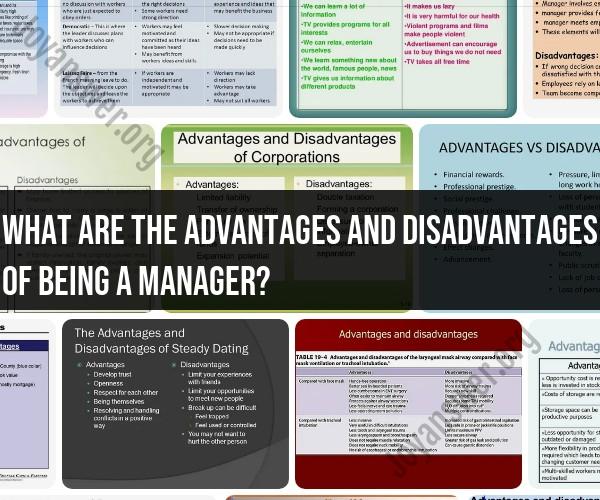What are the advantages and disadvantages of being a manager?
Being a manager comes with a range of advantages and disadvantages. It's a role that carries both responsibilities and rewards. Here are some of the key advantages and disadvantages of being a manager:
Advantages:
Leadership and Influence: Managers have the opportunity to lead and influence their teams. They can shape the direction of their department or organization and guide team members toward common goals.
Decision-Making Authority: Managers often have the authority to make important decisions, which can be empowering and allow them to have a significant impact on the organization's success.
Higher Income: Managerial positions typically come with higher salaries and compensation packages compared to non-managerial roles.
Career Advancement: Being a manager is often seen as a step up the career ladder. It can open doors to higher-level positions and increased responsibilities.
Professional Growth: Managers have the chance to develop valuable skills in areas such as leadership, communication, problem-solving, and decision-making.
Recognition: Successful managers are often recognized and rewarded for their contributions to the organization's success.
Job Satisfaction: Many managers find satisfaction in leading and developing their teams, achieving organizational goals, and contributing to strategic initiatives.
Mentorship Opportunities: Managers can mentor and develop their team members, helping them advance in their careers and reach their full potential.
Variety of Tasks: Managerial roles typically involve a diverse set of tasks and challenges, which can make the job interesting and dynamic.
Disadvantages:
Responsibility and Pressure: Managers are responsible for the performance of their teams and are often under pressure to meet goals and deadlines. The weight of responsibility can be stressful.
Work-Life Balance: Managerial roles often demand long hours and may interfere with work-life balance. This can lead to burnout and strained personal relationships.
Conflict Management: Managers frequently deal with conflicts among team members, which can be emotionally taxing and challenging to resolve.
Accountability: Managers are held accountable for their team's performance and the outcomes of their decisions. If things go wrong, they may face blame and consequences.
Bureaucracy: In larger organizations, managers may contend with bureaucracy, red tape, and administrative tasks that can be time-consuming and frustrating.
Complexity: Managerial roles can be complex, requiring a balance between strategic thinking, tactical execution, and people management. This complexity can be overwhelming.
Lack of Autonomy: In some organizations, managers may have limited autonomy due to strict policies and procedures, reducing their ability to make independent decisions.
High Expectations: Managers are often expected to excel in multiple areas, including leadership, technical expertise, and interpersonal skills. Meeting these high expectations can be challenging.
Performance Pressure: Managers may be subject to performance evaluations and the constant need to demonstrate their value to the organization.
Employee Issues: Dealing with underperforming employees, disciplinary actions, and difficult personnel issues is a common part of managerial roles and can be emotionally draining.
Job Insecurity: In certain industries or during economic downturns, managerial positions may be subject to downsizing or restructuring, leading to job insecurity.
It's important to note that the advantages and disadvantages of being a manager can vary depending on factors such as the organization, industry, and individual preferences. Some people thrive in managerial roles, while others may find them challenging or less fulfilling. Ultimately, the decision to pursue a managerial career should align with your skills, interests, and career goals.












